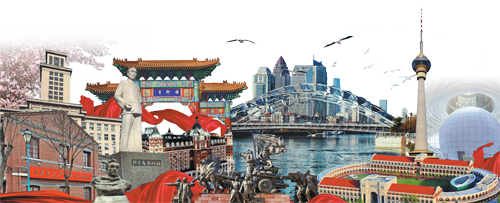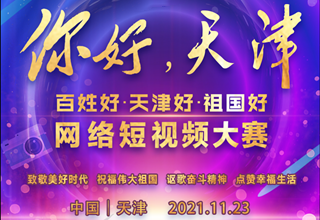Tianjin remembers its foreign friends

Supporters from overseas who helped the Communist Party of China are being honored by the city
International friends who made great contributions to the development of the Communist Party of China in the northern municipality of Tianjin will never be forgotten by their peers in the country.
Inside the many foreign-style villas, which gained the city renown as "a museum of world architecture in China", foreign friends and international communists left their footprints and a history that is an important part of the CPC's story.
Amid the various celebrations to mark the CPC's 100th anniversary, their moving stories are being presented in local museums and halls, including the Memorial of the Former Site of the Northern Bureau of the CPC Central Committee.
Local media, including Tianjin Daily and Tianjin TV, have also highlighted the foreign communists' commitment to the CPC.
"Their shining example simply reflects the spirit of international communism, which also includes the current vision-a community of a shared future for mankind-proposed by President Xi Jinping, who is also general secretary of the CPC Central Committee," said Wang Yongli, vice-president of the Party School of the Tianjin Municipal Committee of the CPC.
Wang recalled a number of renowned figures in history who contributed to the CPC's revolutionary work, joined hands to fight the Japanese invaders and aided the country's liberation efforts.
Edgar Snow, a renowned journalist from the United States and author of Red Star Over China, is a prime example. He gained first-hand experience during a 1936 visit to Yan'an, Shaanxi province, which was the CPC's revolutionary base at the time.
Following the Lugou Bridge Incident in Beijing on July 7, 1937, which is recognized as the start of Japan's full-scale invasion of China and the nationwide resistance to such aggression, Snow actively covered the people's efforts to fight the invaders in Beijing and Tianjin.
"His prominent contribution in the city included risking his life during the dangerous Japanese invasion to help Deng Yingchao, a leading female revolutionary and the wife of former Premier Zhou Enlai-a founding member of the CPC-to travel from Beijing via Tianjin to Xi'an in the northwestern province of Shaanxi,"Wang said.
Israel Epstein, a Polish-born Jewish journalist and author, shared those efforts and exhibited the deepest sympathy for the Chinese people, actively supporting them and the CPC during the fight against the Japanese.
Having lived in Tianjin from a very young age, he took Chinese nationality and joined the CPC after the founding of New China. Epstein was another prominent foreign friend, according to Wang.
"He was a good friend of Snow and teamed up with him to help transport Deng, under the assumed name of Madam Li Zhifan, and risked his life during the invasion and covered the facts during those times," he said.
In 1937, under the CPC's leadership, Deng was accompanied by Snow when she moved to live in Tianjin temporarily, with Epstein shielding her in a hotel.
Epstein's father helped Deng buy a treasured travel ticket at that time. The older man said the family believed in Marxism, which influenced his son's outlook on life.
The younger Epstein was the founder of China Today, a journal published internationally in several languages that showcased China's development.
His English-language book, Mrs Li Zhifan, published in Hong Kong in 1987, recorded that experience.
Song Anna, a 68-year-old author and retired local journalist who has long researched Jewish history in China, interviewed Epstein three times. "During my interviews, Epstein said he had enormous love for Tianjin. The city was the place where he heard the Chinese national anthem (previously a popular song that boosted people's morale during difficult periods) for the first time and cherished the melody for his entire life," she recalled.
Keen support
Medical and military support were crucial before New China could be founded.
Wang noted a series of international friends including: Michael Lindsay, a British professor at Yenching University in 1937; Tillson Lever Harrison, a Canadian doctor; and Richard Frey, an Austrian doctor who arrived in China in 1939.
Frey took Chinese nationality and joined the CPC after the founding of New China.
Lindsay and his wife Li Xiaoli used the fact that they were living in the British concession in Tianjin to help the CPC purchase British medical supplies and wireless equipment, and also trained many local professionals in wireless operations.
Canadian doctor Harrison came to China in 1922 and worked in Shanghai and Tianjin.
After the Lugou Bridge Incident, he joined Tianjin's military forces along with local residents and became a member of the city's Red Cross team.
"After Tianjin was conquered by the Japanese invaders, he bravely protected many injured soldiers and helped to transfer them to safe places," Wang said.
Harrison even sacrificed his life for the country, dying of sickness on his way to transport medical equipment and resources to the liberated areas in Hebei, Shandong and Henan provinces.
The Tianjin stay of Austrian doctor Frey was much longer. Jin Pengyu, a 76-year-old local history researcher, said he helped Frey's son visit his late father's residence in Tianjin.
"When he saw the house I had led him to, he couldn't help but cry," Jin recalled, noting that the son was seeing the places where his father had secretly helped the CPC import numerous medical facilities and medicines.
During the War of Liberation (1946-49), such as the Battle of Tianjin in January 1949, Frey joined the CPC front line and played an important role in helping injured soldiers in Tianjin, according to the vice-president of the local Party school.
Frey joined the CPC in 1944 and took Chinese nationality after New China was established in 1949.
Sacred love
In the history of the foreigners who contributed to the CPC's development in Tianjin, one couple will never be forgotten because their belief and love crossed national boundaries.
Han We Geon was born in what is now the Democratic People's Republic of Korea. Having adopted the Chinese name Li Tiefu, he was Party chief of Tianjin in 1936.
His wife Zhang Xiuyan was a CPC member and also a member of the Beijing Municipal Government Committee and a deputy to the National People's Congress.
According to Wang, Li was a student in Japan, where he organized a communism research association and studied Marxism deeply. In 1926, he was working for the cause of ethic liberation in Korea, but was exiled to China in 1928. He quickly learned Chinese and joined the CPC.
His life in China was turbulent because he was arrested by the Kuomintang and jailed for a time.
According to Cao Dongmei, a researcher with the Party History Research Department at the Party School of the Tianjin Municipal Committee of the CPC, the Korean communist was later appointed Party chief of Tianjin.
He had a solid bond of trust with his predecessor, Liu Shaoqi, a CPC leader who set up the CPC North China Bureau in the city in 1936 and later made great efforts on behalf of the city and Hebei province.
Zhang, Li's wife, was praised by chairman Mao Zedong for "inspiring her 11 family members to join the revolutionary cause for the country".
In 1937, Li died in Yan'an. Zhang never remarried, and according to Cao's research into her memoirs, she believed their love crossed all national and ethnic considerations.
Zhang always kept Li's watch with her and he was in her dreams for the rest of her life, Cao said.
History will never forget these foreign friends and they will continue to inspire the Chinese and other people to unite and work for the CPC's vision-a community of a shared future for mankind.
As one of the first group of Chinese cities that were forced to open to foreign countries in the 19th century, the northern municipality of Tianjin is known for many fine examples of colonial era architecture and as "a museum of world architecture in China". Openness brought international communism to the city. It became a gathering place for many international communists and nurtured many of the CPC's former leaders, including former Premier Zhou Enlai and his wife, Deng Yingchao. In 1936, former CPC leader Liu Shaoqi set up the Party's North China Bureau in the city.

Copyright © Tianjin Municipal Government.
All rights reserved. Presented by China Daily.
京ICP备13028878号-35



